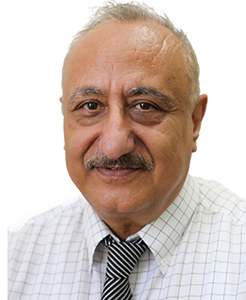Ahed Al Tamimi has become the symbol of the Palestinian uprising, the Intifada, on social media — the latest electronic upheaval in the world. The distinguishing feature of the present Intifada is that its main characters are children like Ahed Al Tamimi, Fawzi Al Juneidi and others.
These people did not emerge to the surface from a vacuum. They are products of the objective conditions in the occupied territories. Tamimi’s father, Basim Al Tamimi, is an educated man with a master’s degree in economics and a retired PLO activist who was arrested several times in the past. The icon of the Intifada, Ahed Al Tamimi was raised in an activist home in the town of Nabi Saleh, where the document launching the first Palestinian Intifada saw the light. Ahed Al Tamimi is also the cousin of martyr Mustafa who was killed in the course of a protest in the same town, where calm has not returned for more than 10 years.
The uprising in the town of Nabi Saleh is not new. It was launched some time ago, especially after the establishment of Halamish settlement, which usurped much of the town’s land as well as its water source, which was declared an archaeological site out of bounds for the public. This struggle is not new-born today and it is not incongruous. It has objective roots in the context of the Tamimi family, the town, and the tragedy of the Palestinians as a whole.
There are many views on this subject, of course. A foreign friend of mine recently expressed to me his opinion that children should not be involved in such demonstrations; conversely, many Palestinians believe that the participation of youth in protests has become an act of suicide because they are shot immediately, so there is no alternative to involving children because they have a small degree of immunity by virtue of their young age.
Unfortunately, neither Israelis nor the civilised world seem interested in helping these children who suffer in their thousands from violence and terrorism at the hands of the so-called Israeli Defence Forces, and hundreds of them suffer arrest, detention and psychological and physical torture. Unfortunately, we enter in 2018 while the world continues to turn a blind eye to these actions against the children of Palestine.
Another notable view came up in a dialogue on an Israeli television channel, where one interlocutor said that these children became the Jeanne D’arc/Joan of Arc of Palestine in the Palestinian struggle for freedom, the same as Joan of Arc fought for the freedom of France. In the opinion of another Israeli, the soldier whom Tamimi slapped in the face was so moral and human that he did not retaliate to the blow. There is also an Israeli body of opinion which maintains that Palestinian families have the right to prevent soldiers from entering their homes and breaking through their walls with limited means of violence, but without using weapons because the soldiers do not have any documents allowing them to enter the house and violate its sanctity.
Amid all these conflicting outlooks, the world has shunned all decency and permitted itself to return to the law of the jungle by doing whatever it deems appropriate to serve its national interests regardless of humane sentiments and international law.
In this new year, 2018, we can only hope that the world may start recognising the rights of all humans everywhere, including the United Nations Universal Declaration of Human Rights of 1948, which considered that fundamental human rights include the right to freedom of movement and the right to life in dignity. These rights were stipulated in Article 2 and elsewhere as follows:
“Everyone is entitled to all the rights and freedoms set forth in this Declaration, without distinction of any kind, such as race, colour, sex, language, religion, political or other opinion, national or social origin, property, birth or other status. Furthermore, no distinction shall be made on the basis of the political, jurisdictional or international status of the country or territory to which a person belongs, whether it be independent, trust, non-self-governing or under any other limitation of sovereignty.”
None of these rights are respected in Palestine, so what good is the United Nations and what has it done for Palestine?
Israeli writer Lisa Goldman says that after four years of media reporting in the West Bank and Gaza, she went to the village of Nabi Saleh. The injustice and persecution of the Palestinians that she saw there eliminated any of her remaining Zionist convictions. Today, we must depend on her and other honourable Israelis who have not lost their humanity to make a stand with the free people everywhere in the world, to defend Palestine’s children, their rights and their humanity. Is it not time to acknowledge that Ahed Al Tamimi is the personality of peace of 2017, who may be the key to the two-state solution?
Finally, I hope that US President Donald Trump will realise that his decision on Jerusalem has led to more than 5,000 Palestinians being martyred or wounded by the end of 2017. If we compare the population of Palestine in the West Bank and Gaza with the population of the US, it would be the equivalent to 500,000 Americans being injured if a disaster were to affect their country. Would Trump not realise then the magnitude of the disaster that has befallen the Palestinian people through his decision? Will he not realise that there are more than 500 Palestinian children incarcerated in Israeli prisons? If we were to compare this to the population size, it would be as if 50,000 American children were sent to jail. Imagine if Trump decided to have this number of children arrested in his country; would we not expect a reaction from the world to this decision?
Ayoub Abu Dayyeh is an adjunct lecturer at Al Zaytoonah University. He contributed this article to The Jordan Times.
